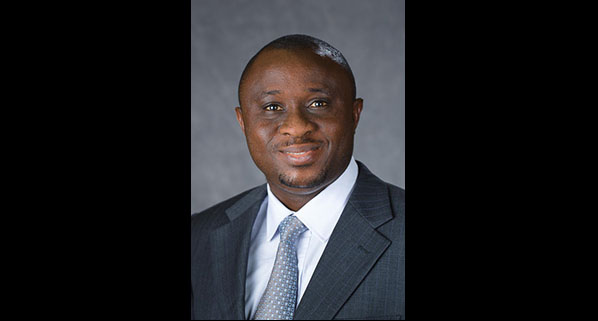Adedeji selected as a fellow of Carnegie African Diaspora Program
Adedeji selected as a fellow of Carnegie African Diaspora Program


A University of Kentucky faculty member will be one of 59 African-born scholars based in the United States and Canada who will travel to Ghana, Kenya, Nigeria, South Africa, Tanzania and Uganda to conduct academic projects at 41 host universities through the Carnegie African Diaspora Fellowship Program. The fellows will work on a range of projects across disciplines, from agroforestry to e-learning modules for nursing, and from ethnomusicology to military mental health.
Akinbode Adedeji, an assistant professor in the UK College of Agriculture, Food and Environment, is currently visiting his alma mater, the Department of Food Technology at University of Ibadan in Nigeria, until June 2. He is working in three core areas of the fellowship: research collaboration, graduate mentoring and curriculum co-development.
Adededji earned a bachelor’s degree in food engineering from Ladoke Akintola University of Technology in Ogbomoso, Nigeria, and a master’s degree in food technology from the University of Ibadan. In 2010, Adedeji earned a doctorate in food process engineering from the Bioresource Engineering Department at McGill University in Montreal, Canada. Following his graduation, he worked as a faculty lecturer and post-doctoral fellow in four different countries—Nigeria, France, Canada and the United States, teaching and conducting research. He came to UK in 2014.
Leading research efforts in value-added agricultural products in the Department of Biosystems and Agricultural Engineering, Adedeji’s research focuses on applying engineering principles to develop processes and systems that will add value to agricultural products and ensure their safety. His specific interests include value addition to underutilized grains, specifically millet, through extrusion processing, which is the biochemical conversion of food processing waste into valuable products and heat and mass transfer applications such as frying, drying and freezing. He’s also interested in the application of non-thermal techniques in ensuring safety and quality of foods and using non-destructive methods to determine the safety and quality of food materials by gathering information from the entire electromagnetic spectrum, rather than just the limited visible spectrum.
Other research Adedeji is actively pursuing includes bioactive compounds and efficient oil extraction and developing appropriate technologies for curbing post-harvest losses in developing countries.
The Carnegie African Diaspora Fellowship Program, now in its third year, is designed to avert Africa’s brain drain, build capacity at the host institutions, and develop long-term, mutually beneficial collaborations between universities in Africa, the United States and Canada. It is funded by Carnegie Corporation of New York and managed by the Institute of International Education in collaboration with U.S. International University-Africa in Nairobi, Kenya, which houses the Advisory Council.
This new round of fellowships will support several projects that involve more than one host institution to encourage cooperation among African universities. Several program alumni will also receive support to enable them to build on previous successful collaborations to advance the projects and deepen the ties among the faculty members and their home and host institutions.
Fellowships match host universities with African-born scholars and cover the expenses for the visiting scholars including transportation, a daily stipend and the cost of obtaining visas and health insurance. A total of 169 Fellows have been selected since the program’s inception in 2013.
Biosystems Ag Engineering


